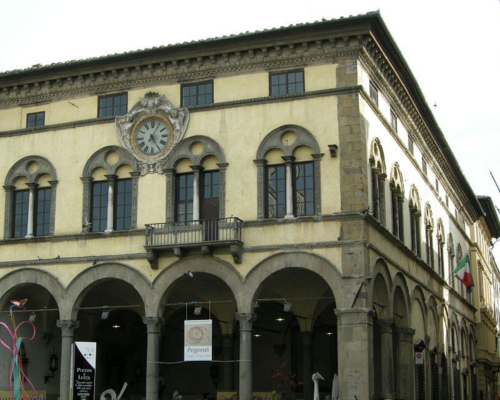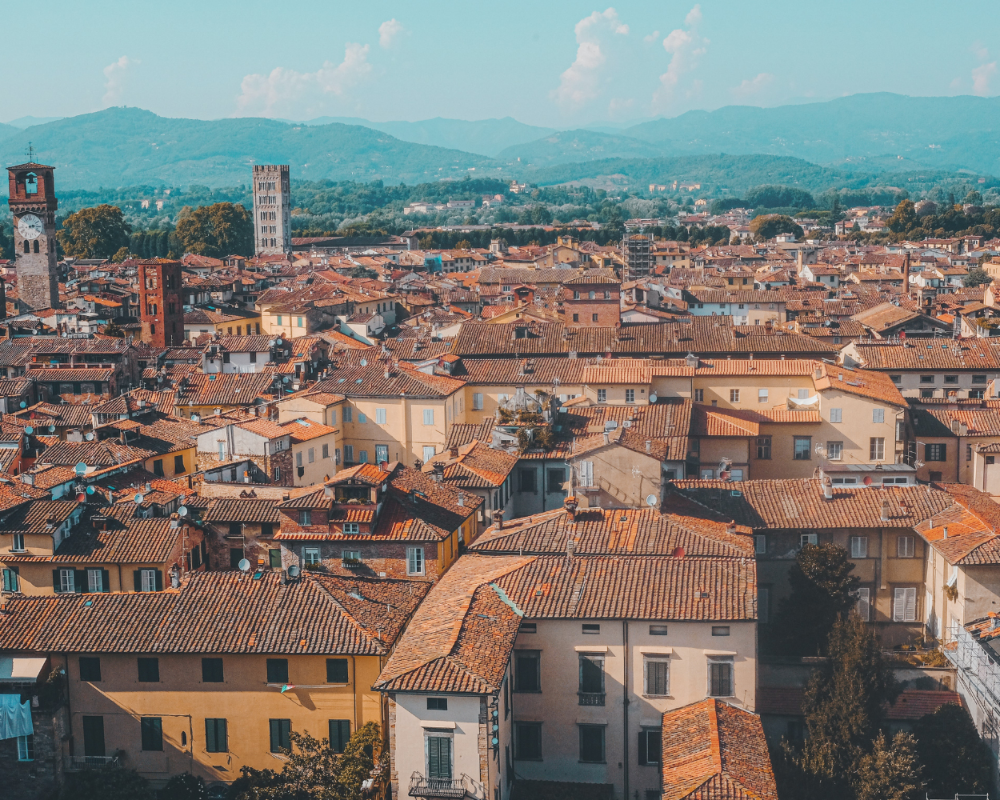

Itinerary to discover Lucca's LGBTQ+ curiosities, from the past to the present
Lucca is known as the city of 100 churches, but in addition to the religious buildings, there's really a lot to see. Walking through the historic center of the city will allow you to discover fascinating, but also unusual, aspects.
In this article, we take you for a walk through Lucca to tell you about a court that condemned homosexuality, Renaissance and, finally, of the new symbols and events that project the city into a future of inclusion.
This itinerary is perfect for walking, so you can also visit other points of interest in Lucca along the way.
Let's start our walk from Palazzo Pretorio, to learn about the history of the Office above Honesty.
Throughout the High Middle Ages and the early Modern Age, Florence and Tuscany were known throughout Europe as a city of easy morals in which homosexuality was common. In 1420, this widespread thought led San Bernardino to speak out against the sodomy that "afflicted" the region. This was potentially the reason why a unique magistracy was established in Lucca.
The Office above Honesty, more commonly referred to as the Court of Sodomites, had the task of repressing this "nefarious vice" that was spreading through the territories of Lucca.
According to the Chronicles of Giovanni Sercambi, there were 43 convictions in Lucca in 1556 and 20 in 1579. The seat of this court was the Palazzo del Podestà, what is today the Palazzo Pretorio in via Vittorio Veneto. The palazzo was erected in 1370 as the seat of the court and then, following extension works, it became the residence of the Podestà of Lucca. Today it houses the headquarters of the Serchio River Basin Authority and the Lucca Academy of Sciences, Letters and Arts.
To learn more, we recommend reading the essay titled "Office above Honest - The control of sodomy in 16th-century Lucca", written by Umberto Grassi.
Let's start our walk from Palazzo Pretorio, to learn about the history of the Office above Honesty.
Throughout the High Middle Ages and the early Modern Age, Florence and Tuscany were known throughout Europe as a city of easy morals in which homosexuality was common. In 1420, this widespread thought led San Bernardino to speak out against the sodomy that "afflicted" the region. This was potentially the reason why a unique magistracy was established in Lucca.
The Office above Honesty, more commonly referred to as the Court of Sodomites, had the task of repressing this "nefarious vice" that was spreading through the territories of Lucca.
According to the Chronicles of Giovanni Sercambi, there were 43 convictions in Lucca in 1556 and 20 in 1579. The seat of this court was the Palazzo del Podestà, what is today the Palazzo Pretorio in via Vittorio Veneto. The palazzo was erected in 1370 as the seat of the court and then, following extension works, it became the residence of the Podestà of Lucca. Today it houses the headquarters of the Serchio River Basin Authority and the Lucca Academy of Sciences, Letters and Arts.
To learn more, we recommend reading the essay titled "Office above Honest - The control of sodomy in 16th-century Lucca", written by Umberto Grassi.
We continue our walk and reach the Palazzo Mansi National Museum, one of the most beautiful residences that testifies to the style of houses used by seventeenth-century Lucca merchants.
Palazzo Mansi is entirely open to visitors. Inside, you can walk among rooms that retain most of the original furnishings and tapestries. It's also possible to admire the magnificent collection of paintings from the sixteenth and eighteenth centuries that are preserved in the Pinacoteca (painting gallery)
In the rooms of the Pinacoteca, some works are exhibited that are related to the culture of the LGBTQ+ community. Among the many paintings, you can find San Sebastiano by Luca Giordano and Una Maga by Francesco Furini.
San Sebastiano is one of the historical icons of the LGBTQ+ community, we covered him extensively in the itinerary to discover Versilia. In Una Maga by Francesco Furini, already known for works related to queer culture that are visible inside the Palatine Gallery in Florence, you can lose yourself among the languid brushstrokes that are typical of his works. Another artist whose work, titled Cristo Portacroce, you can admire is Giovanni Antonio Bazzi, known as Sodoma, whose nickname, according to Giorgio Vasari, derives from his sexual preferences.
We continue our walk and reach the Palazzo Mansi National Museum, one of the most beautiful residences that testifies to the style of houses used by seventeenth-century Lucca merchants.
Palazzo Mansi is entirely open to visitors. Inside, you can walk among rooms that retain most of the original furnishings and tapestries. It's also possible to admire the magnificent collection of paintings from the sixteenth and eighteenth centuries that are preserved in the Pinacoteca (painting gallery)
In the rooms of the Pinacoteca, some works are exhibited that are related to the culture of the LGBTQ+ community. Among the many paintings, you can find San Sebastiano by Luca Giordano and Una Maga by Francesco Furini.
San Sebastiano is one of the historical icons of the LGBTQ+ community, we covered him extensively in the itinerary to discover Versilia. In Una Maga by Francesco Furini, already known for works related to queer culture that are visible inside the Palatine Gallery in Florence, you can lose yourself among the languid brushstrokes that are typical of his works. Another artist whose work, titled Cristo Portacroce, you can admire is Giovanni Antonio Bazzi, known as Sodoma, whose nickname, according to Giorgio Vasari, derives from his sexual preferences.
Leaving behind traditional works of art, we now head to discover the new symbols of the LGBTQ+ community. Once out of the Pinacoteca, we reach Corso Garibaldi, where a rainbow bench has recently been inaugurated.
The bench, created on the occasion of the World Day Against Homotransphobia 2021, was commissioned by various city associations. Among the many was LuccAut, a social promotion association for LGBTQIA+ rights that have been active in the area since 2013, and are promoters of various events involving the local community.
From the square, you can also easily reach several LGBTQ friendly bars in the historic center to have a coffee or an aperitivo with friends.
Leaving behind traditional works of art, we now head to discover the new symbols of the LGBTQ+ community. Once out of the Pinacoteca, we reach Corso Garibaldi, where a rainbow bench has recently been inaugurated.
The bench, created on the occasion of the World Day Against Homotransphobia 2021, was commissioned by various city associations. Among the many was LuccAut, a social promotion association for LGBTQIA+ rights that have been active in the area since 2013, and are promoters of various events involving the local community.
From the square, you can also easily reach several LGBTQ friendly bars in the historic center to have a coffee or an aperitivo with friends.
If you visit the city at the end of October, don't miss the Lucca Comics & Games event. Over the course of the festival, many fans meet in Lucca, with the city becoming a large space dedicated to comics, animation and games.
Lucca Comics & Games is an event that's much loved by the Italian and international LGBTQ+ community, both because there are cosplay events and competitions, but also because it's a great way to learn about new LGBTQ+ themed comics.
If, on the other hand, you visit Lucca at another time of the year, then don't miss the many comics shops in the city.
If you visit the city at the end of October, don't miss the Lucca Comics & Games event. Over the course of the festival, many fans meet in Lucca, with the city becoming a large space dedicated to comics, animation and games.
Lucca Comics & Games is an event that's much loved by the Italian and international LGBTQ+ community, both because there are cosplay events and competitions, but also because it's a great way to learn about new LGBTQ+ themed comics.
If, on the other hand, you visit Lucca at another time of the year, then don't miss the many comics shops in the city.
